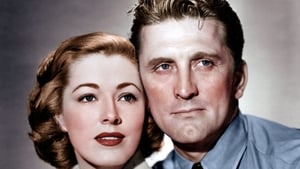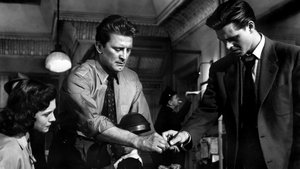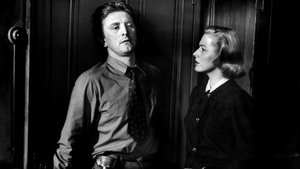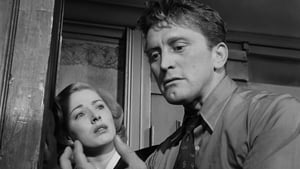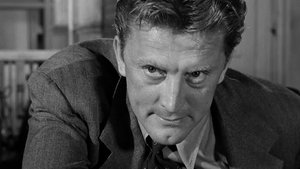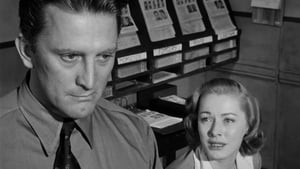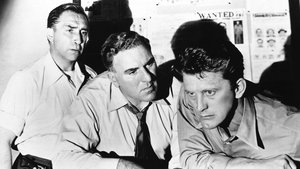Video Sources 0 Views
- Watch trailer
- Detective Story 1951 Colorized

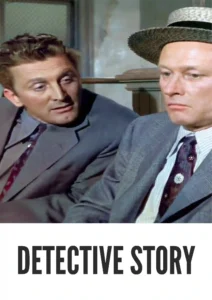
Synopsis
Table of Contents
Toggle
Enter the tense world of law and order with Detective Story, a gripping crime drama from 1951, now brilliantly colorized to amplify its emotional impact. Starring Kirk Douglas as the uncompromising Detective Jim McLeod, and featuring Eleanor Parker, this film explores the complexities of justice and morality within the confines of a New York City police precinct. Ideal for fans of intense character studies and classic cinema, this HD download offers a fresh perspective on a timeless story of ambition, obsession, and the human condition. Also known as The Cop, this cinematic experience awaits.
Detective Story unfolds over the course of a single day within the bustling 21st Precinct. At the heart of the narrative is Detective Jim McLeod (Kirk Douglas), a man driven by an unwavering belief in justice. He sees the world in stark black and white, with little room for compromise or understanding.
As McLeod relentlessly pursues a seemingly routine case involving an abortionist, Dr. Karl Schneider, his own rigid moral code begins to unravel. His relentless pursuit of justice masks a deep-seated personal trauma, which threatens to destroy his marriage to his wife, Mary (Eleanor Parker). The film delves into the lives of various characters who pass through the precinct, each with their own stories of crime, desperation, and hope. Detective Story is a powerful exploration of the human condition, showcasing the blurred lines between right and wrong and the heavy toll that obsession can take on an individual.
The film boasts a stellar cast that brings depth and authenticity to this compelling story:
-
Kirk Douglas as Detective Jim McLeod
-
Eleanor Parker as Mary McLeod
-
William Bendix as Detective Lou Brody
-
Cathy O’Donnell as Susan Carmichael
-
George Macready as Dr. Karl Schneider
Detective Story firmly resides in the crime drama genre, with strong elements of film noir that emphasize its dark themes and moral ambiguities. The film’s intense focus on character psychology and its unflinching portrayal of urban life make it a standout example of the genre.
Released in 1951, Detective Story reflects the anxieties and moral questioning of post-war America. The film’s realistic portrayal of police work and its exploration of complex social issues resonated with audiences seeking more authentic and thought-provoking stories. Detective Story contributed to a growing trend of cinematic realism, challenging the idealized portrayals of American life that had dominated Hollywood in previous decades.
This colorized version of Detective Story has been meticulously crafted using cutting-edge digital technology, enhancing the visual impact while honoring the film’s original atmosphere of tension and suspense. The colorization process involved a detailed analysis of the original black and white footage, with careful attention given to recreating the specific hues and tones of 1950s New York City. Advanced algorithms were employed to ensure that the colors appear natural and lifelike, adding a new layer of depth and immersion to the viewing experience. The aim is to introduce this powerful film to a wider audience while preserving its artistic integrity.
-
: William Wyler
-
: Philip Yordan, Robert Wyler
-
: the play by Sidney Kingsley
-
: Lee Garmes
-
: Robert Swink
-
: Paramount Pictures
-
: Paramount Pictures
-
: 103 minutes
-
: MP4
-
: HD (1080p)
-
: Compatible with a wide range of devices, including smartphones, tablets, computers, and smart TVs.
Detective Story (1951) was a critical and commercial success upon its release, praised for its powerful performances, gripping storyline, and realistic portrayal of police work. The film received several Academy Award nominations, solidifying its place as a landmark achievement in the crime drama genre. It continues to be studied and admired for its unflinching exploration of morality, justice, and the human condition.
-
: What is Detective Story about?
-
A: Detective Story is a crime drama that follows a day in the life of an uncompromising detective whose rigid moral code leads to his downfall.
-
-
: Is Detective Story (1951) a well-regarded film?
-
A: Yes, Detective Story is highly regarded for its powerful performances, realistic portrayal of police work, and exploration of complex social issues.
-
-
: Is this version of Detective Story colorized?
-
A: Yes, this version has been professionally colorized to enhance the viewing experience for modern audiences.
-
-
: What makes Detective Story significant in film history?
-
A: Detective Story is significant for its contribution to cinematic realism and its unflinching exploration of morality and justice.
-
-
: What is the download format?
-
A: The download format is MP4, which is compatible with most devices.
-
-
: What resolution is the download?
-
A: The resolution is HD (1080p), providing a high-quality viewing experience.
-
Experience Detective Story Today!
